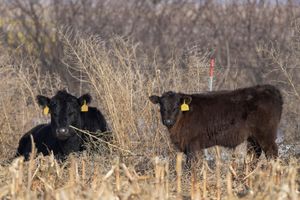How to Identify 3 Common Livestock Diseases

Keeping your farm animals healthy is a full-time job. That starts with purchasing the best livestock feed available, providing shelter, and ensuring that they have proper medical care. But before you can have them seen by a vet, you need to know that something’s wrong. Here are some signs that your pig, cow, or horse has fallen ill.
Indicators Your Livestock Are Sick
Sheep
Bluetongue is a virus that has been found in sheep and cattle common in Texas. It is a virus that is transmitted by very small biting midges. The disease is generally seen in late summer and fall. Virus transmission begins in the early spring with the onset of insect flight activity and continues until the first hard frosts. Some of the signs to look for in affected sheep are stiffness or lameness because of muscular changes and laminitis.
There are 24 different serotypes (strains) that can all be avoided with vaccination. Insect control is also extremely beneficial in avoiding a bluetongue outbreak. This disease has been eliminated in several domestic states but is still prevalent across seas. For more information visit ScienceDirect journal here.
The Texas Veterinary Medical Diagnostic Laboratory has an ongoing program of testing cattle for bluetongue virus serotypes. When new serotypes are detected, their process is to implement management practices to prevent disease outbreaks.
Cattle
 Blackleg is an infectious disease that typically kills young cows within 48 hours of contraction. The pathogen is found in soil and passed on to grazing cattle–luckily, it’s not contagious. Farmers should be wary of blackleg if the soil has been recently dug up or flooded, which allows the pathogen to reach the surface level.
Blackleg is an infectious disease that typically kills young cows within 48 hours of contraction. The pathogen is found in soil and passed on to grazing cattle–luckily, it’s not contagious. Farmers should be wary of blackleg if the soil has been recently dug up or flooded, which allows the pathogen to reach the surface level.
Because this disease acts quickly, symptoms are often not present, but you may notice fever, loss of appetite, and lameness—the latter caused by a lack of oxygen to damaged muscle tissue. The disease is almost always fatal since symptoms are noticed too late, so the best prevention is to vaccinate calves between two to three months of age.
Horses
Equine encephalitis is transmitted by the bite of a mosquito. Symptoms to look out for include twitching muscles, problems swallowing, fever, depression (referred to as “sleeping sickness”), changes in behavior, vision problems, and ultimately, death. Like swine flu, this illness can be passed along to humans, although it is rare. Vaccines are the best defense against this illness, but treatment is also effective for the western strain of the disease.
Clifton Feed and Service Center, Inc. has served the farming community in Clifton, TX, for more than five decades. Along with providing top-quality livestock feed to keep your animals healthy, this farm supply store also offers lawn and garden tools, pet food, apparel, fencing materials, decorative items, and more. They believe in providing top-tier customer service for orders both large and small. Stop by or call (254) 675-3416 for more information. If you’d like to look at their product line, be sure to visit the website.
About the Business
Have a question? Ask the experts!
Send your question

